The nine most quintessentially British holiday experiences

Self-deprecating, sarcastic, apologetic, queue-fanatics with bad teeth and a mild obsession with tea. That’s how the world sees the British.
Throw in the word "countryside" and you can add a few more quirks to this list – odd outfits, fancy hats and obscure hobbies. Not forgetting the setting, of course – an obscenely grand manor house surrounded by extensive grounds. Or at the very least a rural cottage complete with beams, an Aga and an open fire. There’s probably a dog bounding around somewhere, too.
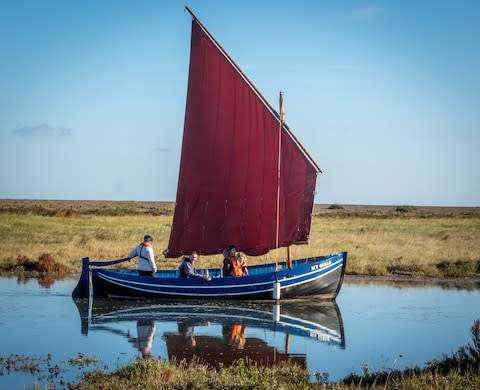
And what do these eccentrically attired folk do in the great outdoors? They kill things. They train animals. They turn animals into things to wear. Naturally.
These stereotypes may seem a little outdated to anyone who has ventured beyond the boundary of the M25 in the last 10 years and encountered the chain-filled high streets of Britain's towns; they all seem to be one and the same.
But don't despair: if the proliferation of Bill's is getting you down, you might train in millinery. If there's one too many Starbucks around for your liking, you can hone your Robin Hood skills (although we don't recommend thievery as a legitimate career change).
This is, after all, a nation that is home to the villages of North Piddle, Bell End, Booby Dingle and Slaughter – both Upper and Lower. A nation where a holiday location is judged by the number of local pubs, where the egg & spoon race is considered a legitimate sport, and where there is never, ever a good reason to be impolite.

Below, we've selected the most British activities possible, all of which you can book through some of the country's best boutique holiday cottage companies, which specialise in luxury properties across a small area.
1. Be as mad as a hatter
No other nation loves hats as much as the British. You can instantly place a historical figure in the right century simply by identifying their headwear and even our best-loved fictional characters can be distinguished by them – think Robin Hood, Mary Poppins, Sherlock Holmes and Paddington Bear. You’ll never see the Queen on an official visit without one – even minimalist Meghan Markle has succumbed.
Louise Pocock Millinery in the Cotswolds offers workshops in which you make your own hat in just a day or two. "Everyone can wear a hat," says Louise. "and I believe most people can make one...There are no rules – only creative thinking and the ability to shape, mould and transform a natural fibre into a wearable work of art."
How to do it
Book a hat-making class (which cost from £90 per day) through Luxury Cotswold Rentals, which offers a small selection of carefully-curated properties in the Cotswolds, such as Burden Court, a grade II*-listed 17th-century farmhouse.
2. Add another string to your bow
Though Robin Hood may be our most famous arrow-wielding hero, Game of Thrones has brought a renewed interest in archery. In fact, the British obsession with archery often undergoes a revival when the sport seems like it's about to fall off the map – mainly thanks to our propensity for notalgia and our bizarre love of an underdog.

How to do it
With the spectacularly grand grounds of Sibton Park in rural Suffolk as the backdrop, this quintessential country pursuit (from £120 per hour) is presided over by an expert – making sure that you don’t ‘accidentally’ put an arrow through your partner’s leg. It can be booked through the Wilderness estate – a 5,000 acre private estate home to a selection of beautifully restored manor houses, farmhouses and cottages.
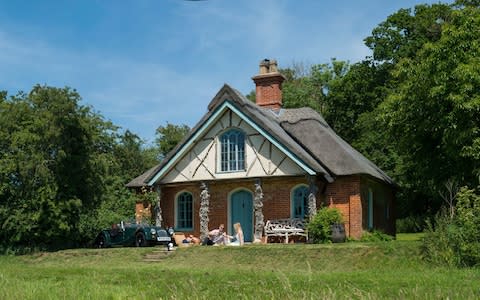
3. Tuck into traditional fish and chips
Friday night fish and chips is a bit of a British staple. The tradition, in part, is a result of our Christian history, with many devout Christians once refraining from eating meat on a Friday.

Today, the motivation is much more simplistic – fish and chips are delicious. Especially with scraps (also known as scrumps, batter, bits and crunchies depending on whereabouts you are in the UK). The chips are always a bit of a contentious issue among the British though. Some like them doused in good old fashioned vinegar, some like to dunk them in curry sauce and some – believe it or not – believe that they should be smothered in gravy and topped with cheese.
How to do it
In honour of the tradition (and after being repeatedly requested by batter-barmy British guests), The Freeth, a privately-owned hunting lodge on the edge of the ancient Netherwood Estate in Herefordshire, introduced its own Friday Night Fish (from £14 per person).
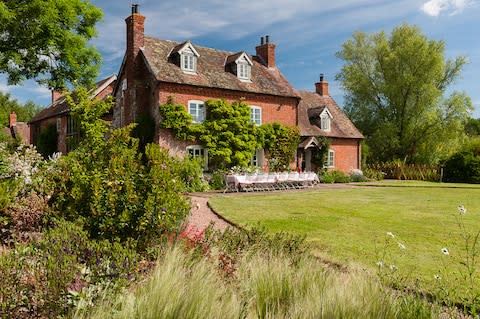
A team of cooks arrive at the lodge and prepare traditional fish and chips featuring line-caught Cornish cod, hand-cut chips, traditional mushy peas and homemade tartar sauce – so you don’t have to venture out from this remote Elizabethan hunting lodge to find the nearest chippy.
4. Take your best shot
First, a lesson: game birds, such as pheasant, grouse and pigeon, are "shot", while deer are "stalked" – and the word "hunt" is associated with hounds, a practice that was banned in 2005.
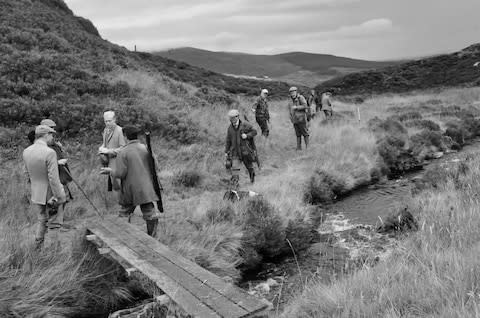
For shooting, a flat cap, wellies and Barbour jacket are traditionally donned before heading out.
How to do it
George Goldsmith, a small boutique company specialising in sporting estates and exclusive properties throughout Scotland offer a variety of shooting days from grand properties such as Aldourie Castle by Loch Ness in the Highlands.
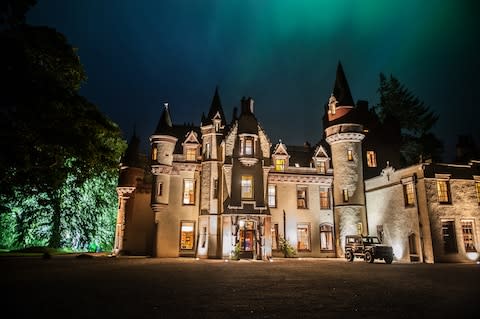
Bird hunts are offered in the form of either walked-up (from £250 per gun per day) or driven (from £34 per bird) experiences, with the former catering for 4–6 guns and the latter 8–9. For grouse, the season begins on the Glorious Twelfth (of August). You can also go stalking here – it's a bloody business, but they need help managing the population of Scotland's largest native wild land mammal, the red deer.
5. Embrace the great outdoors
The British stubbornly believe our coastline is the best in the world – rugged and wild, dotted with idyllic beaches (think more of Cornwall, Devon and Northumberland than Blackpool or Great Yarmouth). It’s the kind of place that you just can’t justify lounging around indoors.
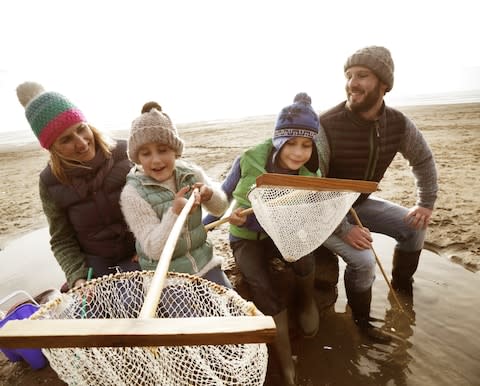
Besides, nothing would keep good British folk inside when holidaying by the sea. Sheer stubbornness will drag any self-respecting Brit out in gale-force winds and heavy rain. In their shorts. After all, it's only spitting and you're on holiday – and being outside is simply what one does on holiday.
How to do it
To make the most of Pembrokeshire's beautiful seascapes, Coastal Cottages offers a huge variety of outdoor activities. On a ‘Coast Path Walk & Rock-Pooling’ experience (from £42 per person for half a day), you'll be accompanied by a rock-pooling expert who'll teach you all about the unique marine environment. If you’re a bit more adventurous, climbing and coasteering are also on offer.
6. Mess about in boats
Perhaps because we’re surrounded by water, perhaps because it’s something that we're rather good at, perhaps because there are lingering traces of Viking blood, the British love to sail.
As the Water Rat said to the Mole in Kenneth Grahame's Wind in the Willows, "believe me, my young friend, there is nothing – absolutely nothing – half so much worth doing as simply messing about in boats."
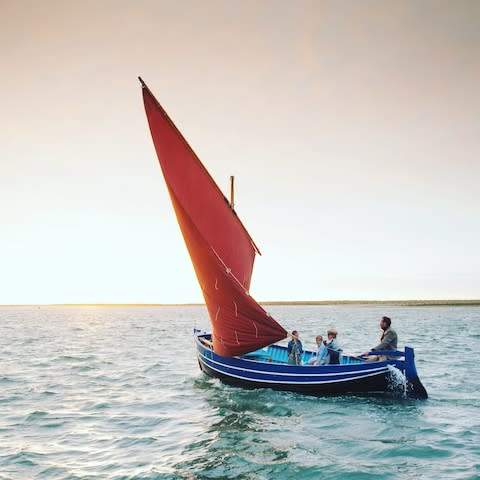
How to do it
The Norfolk Broads have long been associated with the water and the boutique luxury cottage company Barefoot Retreats, which specialises in pristine properties on the North Norfolk coast, has teamed with the Coastal Exploration Co. to offer a range of experiences on these iconic waterways (from £90 per person).
With a traditional sail boat and knowledgeable local skipper at your disposal for the day (from £340 for an exclusive charter), you can explore the North Norfolk coast and its small creeks, try out wild swimming, foraging and spear fishing and tuck into some locally-sourced goodies. There’s even an experience that involves learning traditional smuggling techniques and running an operation.
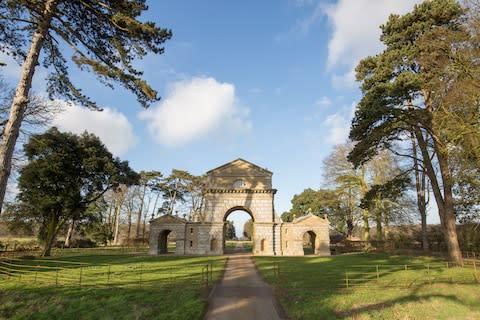
7. Come fly with me
We’ve been flying falcons in the UK since 860. These powerful birds were used to hunt long before the invention of gunpowder, and were trained and looked after by the resident falconer. This is yet another activity on our list that was once reserved for the British royal and rich – after all, who else could reasonably afford to keep a man dedicated solely to the care of a handful of birds?

While the practice has diminished over the years, there's a generation of Harry Potter-mad fanatics that have grown up thinking how cool it would be to own their own owl, meaning that falconry has had an increase in interest over the last decade and there are a few places across Britain where you can interact with these magnificent raptors.
How to do it
John Dowling Falconry has teamed up with Luxury Cotswold Rentals to offer guests an interactive experience (from £55 per person). At Dryhill, you can learn about the falconry’s incredible collection of birds of prey, including the famous peregrine falcon.
8. Sling your hook
Is there a better way to spend an afternoon than dressed in a pair of rubber dungarees, standing for hours in freezing water that comes up to your waist, patiently waiting for a nibble? Apparently not.
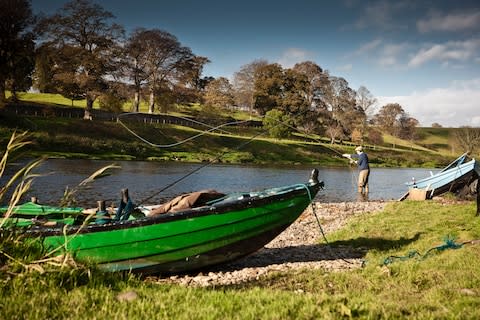
And while you'd think that the point is to catch something tasty for your supper, that's not always the case. You might choose to catch and release. People do the standing in the cold water just for fun.
How to do it
Head north, where Crabtree and Crabtree, a family-run company that handpicks luxury cottages from across their home of northern England and Scotland, offers fishing from many of their properties (from £1,490 per week including accommodation and fishing).
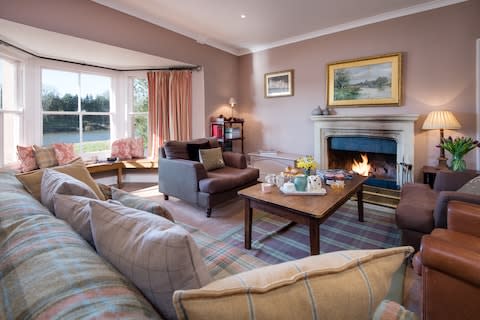
The salmon season on the River Tweed runs from February 1 to November 30, and the company has four houses that have their own private fishing grounds – many within steps of the front door. You can also hire an experienced ghillie who can teach you how to cast your first line.
9. Do ostentatious things in inclement weather
OK. So yoga might not quite be quintessentially British, but we couldn’t resist including this one as it’s so much fun – our Family Editor Sally Peck recently tried this out on the beautiful beach of Trevaunance Cove in St Agnes with her husband and children in February and raved about it.
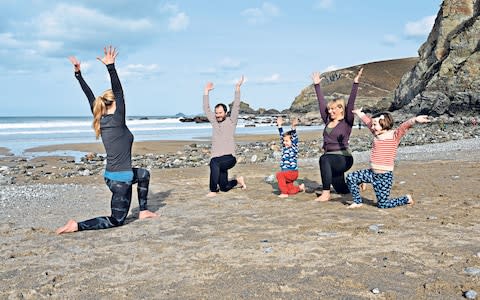
Yes, it will likely rain, and the odds are certainly against you if you’re hoping for a completely dry session, but it’s well worth the risk. The seaside setting is as relaxing as you could hope for. The waves provide a hypnotic soundtrack, the sand cushions your joints and the exercises are gentle enough that the whole family can get involved.
How to do it
Book private lessons along the northern Cornish coast with Helen Clare (from £60 for an hour-long class) via Beach Retreats, who specialise in contemporary beach-chic properties across Cornwall.


